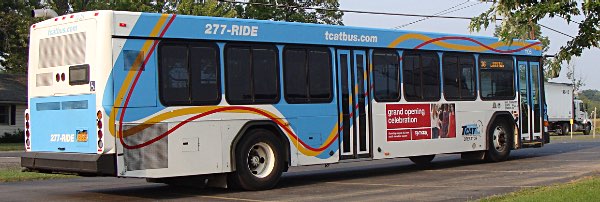- By Patty Poist
- News
 Print
Print 
The inevitable drop in ridership due to increasing numbers of people staying home to protect themselves from the spread of the coronavirus is prompting TCAT to reduce service, TCAT General Manager Scot Vanderpool announced today. The tentative start date for soon-to-be announced revisions is Sunday, March 22. They will remain in effect through the remainder of TCAT's winter-spring service period ending Saturday, May 23.
With increasing number of people told to avoid face-to-face contact and work and learn remotely, demand for transit will most certainly decline.
Cornell University, which is TCAT's largest ridership base, heightened its precautionary measures this afternoon by suspending all classes effective 5 p.m. today. The university is encouraging all undergraduates and some professional students to leave campus and move to their permanent homes as soon as possible. Students will be able to resume classes remotely on April. 6. See full statement from Cornell President Martha E. Pollack here.
TCAT service reductions will be similar to those TCAT makes during the summer when most students leave town for their year-end break. From late May to late August, TCAT maintains routes that accommodate its year-round riders, but trims the level of peak time service needed to meet demand during the fall and spring semesters.
"We are mindful that there are many people in our community, including our rural riders, who use our service 12 months a year, and want to assure them that we will continue to make every effort to meet their needs," Vanderpool said. "We will also work with our local stakeholders to make sure our community remains protected."
TCAT Assistant General Manager Matt Yarrow, who oversees TCAT's service development, said that additional changes may be needed throughout the service period depending on how the crisis evolves. TCAT will do its best to inform and update its passengers with service changes via its website, public notifications on its Bus Tracker and MyStop app, and with notifications posted on buses and shelters.
"This is both an unprecedented and unpredictable time for everyone, plans are changing constantly making clear and timely communications essential," Vanderpool said. "Our best course of action is to stay on top of pertinent updates from health experts and heed their advice."
Earlier this month, TCAT and paratransit provider Gadabout, both of whom operate out of the same facility at 737 Willow Ave., implemented a series of preventative measures to include: posting information that stresses good hygiene; reminding people to self-isolate if they are sick or show signs of illness; asking passengers to use hand sanitizers on buses; disinfecting surfaces inside each bus nightly and frequently sanitizing all employee and passenger areas. Transit agencies all across the country have been adopting similar practices in recent weeks with advice from their local health departments, the Centers for Disease Control and Prevention and public transportation trade groups to include the American Public Transportation Association in Washington, D.C.
Vanderpool and Assistant General Manager Mike Smith, who oversees TCAT's operations and maintenance crew, both met this week to discuss service adjustments and their business impact with leaders from the United Auto Workers Local 2300, which represents most of TCAT's hourly work force. "We are committed to working together to make good decisions that make sense as a business and that are also informative and comforting to operators and mechanics," Vanderpool said.
Vanderpool also assured the union and all TCAT staff this week that their jobs are secure. "It's obviously too early predict the level of revenue losses with any measure of accuracy as transit agencies and the global economy in general are all in uncharted territory," Vanderpool said, adding, "I am confident that we will get through this crisis by supporting one another, by remaining calm and by following the advice of health experts."
In addition to Cornell, Ithaca College and TC3 also said this week they were moving toward long-distance learning. All three institutions of higher learning, as well as numerous community organizations and businesses, have been implementing a number of other preventative measures to limit in-person contact.
v16i12
